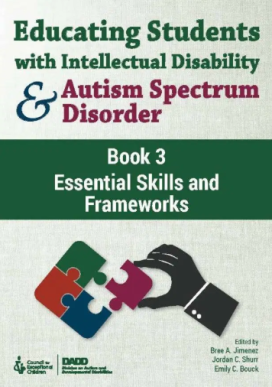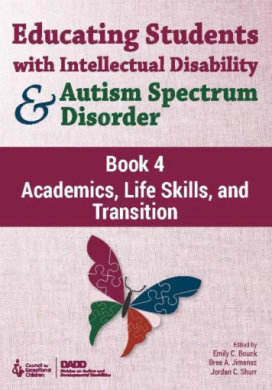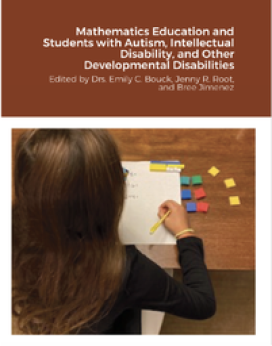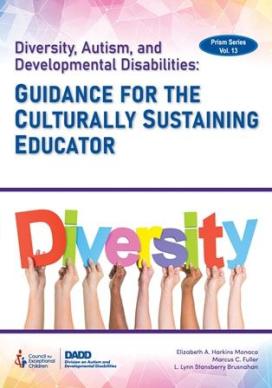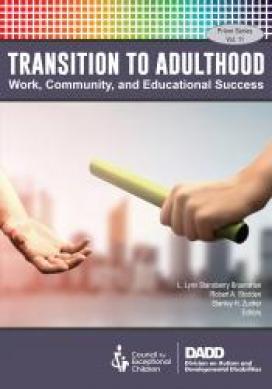Other Publications
Books
Educating Students with Intellectual Disability and Autism Disorder is a comprehensive resource, providing educators with the most up-to-date information on what works in real classrooms with real students. Edited by: Shurr, Jimenez, & Bouck. Written by Shurr, Jimenez, and Bouck and contributing authors.
PURCHASE BOOKS
Image of book series. Educating Students with intellectual disability and Autism Spectrum Disorder 4 book series
4 BOOK SERIES
*Click the title of any of the four books below to learn more.
Book 1: Research Based Practices and Education Science, a comprehensive explanation of the four learning stages–acquisition, fluency, maintenance, and generalization–and how understanding this process can help educators plan instruction.
Book 2: Foundational Concepts for Leadership and Collaboration, includes topics of teacher leadership and advocacy, collaborating with colleagues, and working with diverse students and their families.
Book 3: Essential Skills and Frameworks, addresses a range of topics, from augmentative and alternative communication to the foundations of student behavior, social interactions and communication, student self-determination, and supporting students with more complex needs and multiple disabilities.
Book 4: Academic, Life Skills, and Transition, takes up the controversial topic of what to teach—should the focus be on academics or on functional or life skills?—and stresses that the education of students with ID and ASD should involve both.
Mathematics Education and Students with Autism, Intellectual Disability, and Other Developmental Disabilities
Editors: Bouck, Root, & Jimenez
Visit our DADD Marketplace to purchase today (Digital Download $20)
CLICK HERE TO PURCHASE
PrISMS
The Prism series is a collection of volumes that highlight evidence-based research-to-practice teaching strategies and interventions geared toward supporting students with autism spectrum disorder, intellectual disability, and other developmental disabilities.
Diversity, Autism and Developmental Disabilities: Guidance for the Culturally Responsive Educator is the 13th in the Prism series, developed by the Council for Exceptional Children Division on Autism and Developmental Disabilities. Edited by Elizabeth A. Harkins Monaco, Marcus Fuller & Lynn Stansberry Brusnahan, this book is about intersectionality, which is a way to understand social inequalities by acknowledging how multiple overlapping social identities impact and oppress certain populations. Examples of social identities include race, class, gender, sexual orientation, religion, and [dis]ability, among others. Each category – race, gender, and [dis]ability – places a student at higher risk of discrimination or oppression. An intersectional perspective requires sensitivity, vulnerability, and a willingness to listen to alternative perspectives.
Embedded Instruction is the 12th in the Prism series, developed by the Council for Exceptional Children Division on Autism and Developmental Disabilities. Written by J. Matt Jameson, John McDonnell, Tim Riesen, and Shamby Polychronis, this book gives teachers and other special education professionals an overview and serve as a guide to the development and implementation of embedded instructional programs. Illustrated by vignettes and including sample planning and implementation tools, it is a valuable resource to professionals in home, school, and community
The Board of Directors of the Division on Autism and Developmental Disabilities of the Council for Exceptional Children are pleased to announce that the 11th volume in the Prism series is now available for purchase through the CEC bookstore (http://pubs.cec.sped.org/p6296/). This 11th volume in the Prism series, titled Transition to Adulthood: Work, Community, and Educational Success is co-edited by L. Lynn Stansberry Brusnahan, Robert A. Stodden, and Stanley H. Zucker. This latest release in the DADD Prism series provides a blueprint for supporting youth with autism, intellectual and other developmental disabilities in achieving their postsecondary goals in a variety of adult settings – education and training, employment, and the community. With eight chapters written by 20 authors, Transition To Adulthood covers a wide range of topics, from assessing students’ interests and abilities to fine-tuning their education plans and goals, ensuring that students with autism and intellectual and developmental disabilities are included in a variety of settings, and building community relationships to ensure their continuing inclusion. It provides a valuable resource for transition personnel, special and general educators, and special education administrators at the school and state level, as well as adult service professionals.
CLICK HERE FOR MORE INFORMATION and TO PURCHASE
Prism 10, Differentiating Instruction in the Inclusive Classroom: Strategies for success, co-authored by Barbara Gartin, Nikki Murdick, Darlene Perner, and Marcia Imbeau;
Prism 9, Footsteps Toward the Future: Implementing a Real-World Curriculum, co-authored by Emily Bouck, Teresa Taber-Doughty, and Melissa Savage;
Prism 8, Friendship 101: Helping Students Build social Competence edited by Juliet Hart Barnett and Kelly J. Whalon; Prism 7, A Guide to Teaching Students with Autism Spectrum Disorders, edited by Darlene E. Perner and Monica E. Delano, all of which are available from CEC at http://pubs.cec.sped.org/p6198/.
Also look for the DADD books on Social Skills for Students with Students with Autism and Other Developmental Disabilities, authored by Laurence Sargent, Darlene Perner, Mark Fesgen, and Toni Cook and available in both elementary and secondary versions.


